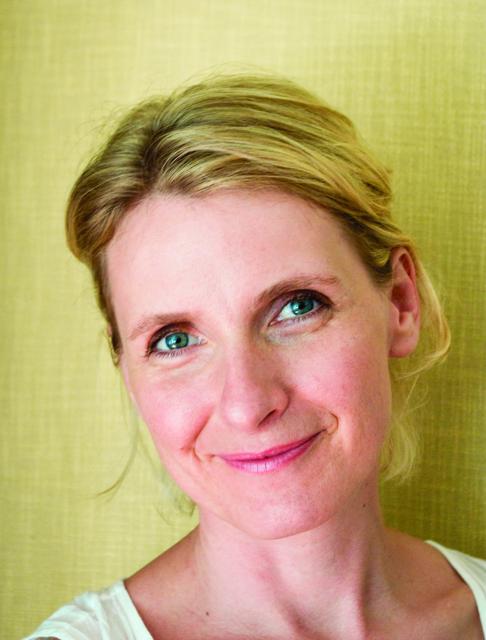- "The only thing marriage has ever done, historically and definitionally speaking, is to change,” says Gilbert in her book, Committed, now out in paperback. Author photo by Shea Hembrey
Author Elizabeth Gilbert says that 15 years ago, she believed love was something she would stumble onto "like an Antiques Roadshow treasure kind-of thing. 'Oh my God! Look what I've found! Something really valuable right here in this bar!'" And of course it would be love at first sight. These romantic notions and expectations lead to some huge disappointments for Gilbert, including a painful divorce that she eventually parlayed into the bestseller-turned-Julia Roberts vehicle Eat Pray Love. These days, Gilbert is a bit more realistic: "The real, lasting loves are stories that are unfolding. It's something that you make and grow and work on, it's not necessarily something that you find. You can find the opportunity for it, but then it's up to you to make it."
In fact, since Eat, Gilbert has fashioned one heck of a romantic love story of her own. The man she called Felipe, whom she met in Bali (the "Love" section), turned out to be much more than a memoir's final chapter. Gilbert and the Brazilian-born, Australian-national gem salesman quietly went about creating a life together that, due to their different nationalities, involved a lot of passport milage. They were happy with the arrangement, however, because it meant the pair, both burned by divorce, would never marry. And then the Department of Homeland Security decided otherwise: Make it official, or Felipe would be, in essence, deported. ("The government would not be issuing an actual shotgun with all the paperwork, but it did have that sort of feeling," Gilbert wrote, her trademark wit intact.)
So Gilbert decided that, if she was going to get married again, she was going to enter matrimony with as much knowledge as possible, which brings us to Committed: A Love Story. "Just to reassure myself that I was a mature and sober-thinking person, it meant a lot to me to give marriage as much thought as I did," she says. Committed is a dense 279-page exploration of marriage through the lens of culture, history, religion and personal analysis. "Even the very word 'matrimony' comes to us from the Latin word for mother. We don't call marriage 'patrimony.' Marriage carries an intrinsic assumption of motherhood, as though it is the babies themselves who make the marriage," she writes in the chapter "Marriage and Women." And, "The marital kitchen can become something like a small linoleum temple where we are called up daily to practice forgiveness, as we ourselves would like to be forgiven."
Committed (released in paperback on Feb. 1) has a slightly different title — the hardcover is called Committed: A Skeptic Makes Peace with Marriage. And that suggests that, since publication (indeed, since Gilbert and Felipe's peremptory marriage), Gilbert has softened her views on matrimonial vows.
"So much of that book is an attempt to calm a pressing anxiety and that anxiety turned to vapor after the event because nothing happened," says the author. "I had demonized marriage so much, in a way. It turned out that our love story was in tact."
Committed was written during the months of travel while waiting for fiancé visas (they had to live abroad in order to be together, which meant cheap digs in various Southeast Asian locales). Gilbert taps the knowledge of the Hmong women in Vietnam; she's inspired by novice monks in Laos; visits newly weds in Luang Prabang and seeks insight (with mixed results) in Cambodia. Gilbert works over the subject of marriage (for better or worse) like a worry doll, offering up her own thoughts. On gay marriage: "So why not welcome them in? Why not recruit them by the van-load to sweep in on heroic wings and save the flagging and battered old institution of matrimony from a bunch of apathetic, ne'er-do-well, heterosexual deadbeats like me?"; and coming to her own conclusions: "The only thing marriage has ever done, historically and definitionally speaking, is to change. Marriage in the Western world changes with every century, adjusting itself constantly around new social standards and new notions of fairness."
By her own account Gilbert was "so assiduously avoiding even the language of marriage" that it's almost surprising to hear her now, four years since she said, "I do," sounding so at ease with the institution. "It turned out well, but by the same token there are lessons that I gathered that have been consistently helpful," she says. "Turns out it really does make a difference who you're married to, as far as how you experience marriage. And there's something to be said about the difference between getting married at 23 and getting married at 39. The entire thing is shaped and altered by that."
There have been other shifts in Gilbert's life, like her subject matter. In the intro to Committed she talks about first being told that she "wrote like a man" (she wrote for GQ and Spin, her book prior to Eat, Pray, Love was The Last American Man about WNC naturalist Eustace Conway) and then being classified as a "chick lit" author. (Having Julia Roberts play you in the dramatization of your memoir will do that.) Now: "Really what I'm interested in is plants and gardening, and so that's why I'm writing a novel about 19th-century botanical exploration," she says. And she's not joking.
"There was a fascination I had in men that really informed a lot of my late teens, 20s and early 30s," says Gilbert. ”And then, I turned my attention to trying to sort out my own life. Knock on wood, there's nothing more about myself that I feel like exploring in print."
— Alli Marshall can be reached at amarshall@mountainx.com.
who: Elizabeth Gilbert
what: Discussion and booksigning for Committed: A Love Story
where: Lipinsky Hall, UNC-Asheville campus
when: Saturday, Feb. 5 (2:30 p.m., $22.24 includes copy of book. Order tickets by calling 254-6734 or at malaprops.com)






Before you comment
The comments section is here to provide a platform for civil dialogue on the issues we face together as a local community. Xpress is committed to offering this platform for all voices, but when the tone of the discussion gets nasty or strays off topic, we believe many people choose not to participate. Xpress editors are determined to moderate comments to ensure a constructive interchange is maintained. All comments judged not to be in keeping with the spirit of civil discourse will be removed and repeat violators will be banned. See here for our terms of service. Thank you for being part of this effort to promote respectful discussion.